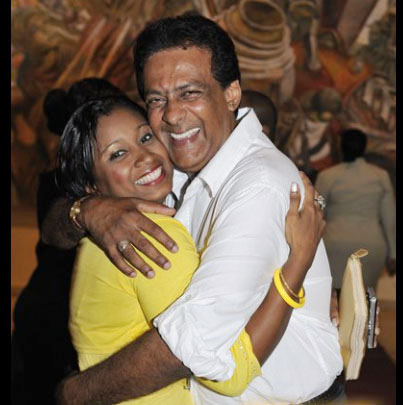Ronald Hollingsworth explores the tech-crazed behaviour or rather obsessions of cellular-loving folks in his play Text Me and unravels an interesting story of distrust, love and friendship.
Could a cellular phone really destroy a relationship? Relationships have had their ups and downs long before cellular phones took over our lives, but these days you can’t help but wonder right?
What is interesting is the fact that every new phone on the market is changing how we interact whether it is the Android experience or discovering what’s new with the Blackberry or the iPhone.

This world it would appear has gone phone crazy as Hollingsworth’s storyline reveals, and as he introduced the characters in Text Me there was the uncomfortable feeling that you not only recognized them in some persons close to you, but that a character could have easily been you.
Mahadeo Shivraj, possibly the finest director working locally, masterfully directed Hollingsworth’s Text Me while skillfully portraying the role of the character, Wasir. He was such a joy to watch and by the time the play was over, some folks at the National Cultural Centre wanted to invite Wasir out for drinks.
Wasir hated cellular phones because they corrupt human relations, to put it bluntly. His wife, played by the incomparable Sonia Yarde, loved them and was phone savvy enough though she didn’t own one. The family unit, which was complete with two well-adjusted yet vulnerable children, was functioning pretty smoothly until Wasir relented and got his wife a phone.
On the other side of the white picket fence was Jeff, played by rising young actor Kijana Lewis, and his wife Jess and their young boy. Jeff had money, power, a beautiful wife and son and he changed phones like he changed his clothes.
The story seemed like any typical one until Jeff’s wife died from cancer and left him struggling to raise a young son and drawing closer to his neighbour and good friend’s wife.
Technology has seriously altered our relationships and Hollingsworth vividly brings this to life in his play showing how friends prefer to text each other than actually see each other, and how text messaging went from sharing a few words to exchanging sexually explicit photos or ‘sexting’.
There is a difference between a good play and a great play, and Ronald Hollingsworth has a gift for writing great plays. The story follows the families as they grapple with the changes in their lives, adjusting to new things like a cellular phone in Wasir’s household.
Wasir’s young son was caught up in a scandal at his school over a ‘sexting’ story and was slapped with suspension and we also learnt that his daughter was using her mother’s phone to send secret love messages to a potential boyfriend.
The play evoked a range of emotions including anger, laughter and sorrow. As the characters laughed the audience shared in the jokes and as they hurt; the audience felt for them. It was Hollingsworth in his element, and from beginning to end he was able to keep people tuned in.
When he introduced other characters like Jess’s brother and sister who fought ‘tooth and nail’ for her expensive cellular phone when she died, and in the case of her sister; the majority of her things, the audience loved them.
Text Me sits comfortably up there with many of Hollingsworth stronger plays and its timing is relevant given people’s thirst for the latest phones. Hollingsworth, to his credit, serves up no guilt as far owning an expensive phone or a phone for that matter goes; he simply challenges us to examine our relationships with each other.
More importantly, he forces us to recognize that the relationships count and that we ought to treat them as such even if it means putting down the phones and just talking to each other. Forget texting me, just talk to me.





